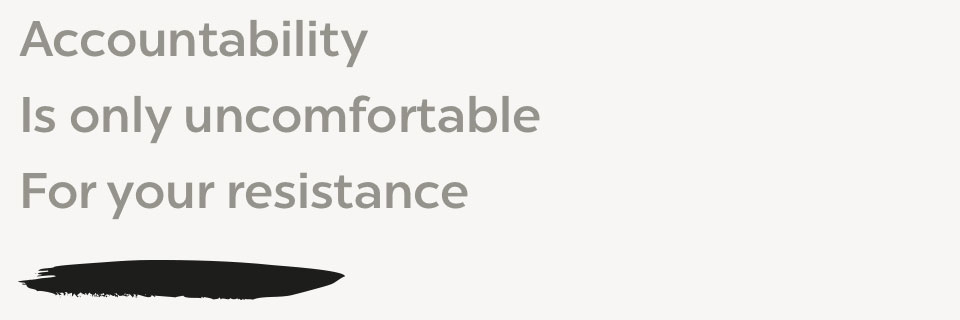We’ve already discussed how personal growth and facing your shadow takes energy and causes productive, real pain that gets to the source of the frustrations in your life. It’s all hard, it’s all work, and it’s always your choice.
In the context of hunger for self-learning, let’s look at the subject of accountability. For a hungry person, being held accountable is the greatest of gifts. A person hungry for self-knowledge and authenticity uses every stimulus available to further their search for their truest self, their deepest meaningfulness, and realest experience of Reality. A hungry person wants to get to the bottom of things, including themselves, because they know that their own self-deceit, their own off-ness, their own inner conflicts are the source of all their suffering.
So, when a hungry person is held accountable, at least part of their reaction is, “Wow, I didn’t know that about myself! It doesn’t feel good, but it’s real to feel, and now I can do something about it.”
A not-hungry person makes excuses, shifts blame, minimizes, performs lip-service, etc. A not-hungry person is more interested in staying comfortable than learning about themselves and is usually in denial about how their inner issues are creating the outer problems in their life each day.
It can take years to cultivate this kind of hunger, largely because our parents generally did not do a good enough job making the path of self-learning comfortable enough. They did the best they could, certainly, but as adults we must pick up the slack and face into the fear that if people really knew how screwed up we were that we’d be abandoned and unloved, when this is the strategy everyone is operating with all the time.
Please trust that anyone who abandons or harshly judges you for vulnerably displaying your faults in a self-responsible way is not someone you want to associate with anyway.
We all have shadows. We’re all wounded. We’re all screwed up. We’re all looking for personal growth in one capacity or another. What’s the problem? The problem is that the energy we need dearly to address our shadows is largely put in service of keeping the shadows hidden. This is a stagnative gerbil wheel and the state of our world.
For all of these reasons, the ideal context for a business is that each and every person involved is hungry to learn about themselves and is actively engaged in using their job for self-knowledge. This is the foundation for healthy accountability and dissolves the “us vs. them” dynamic too common in management.
This is what Michael Gerber meant in The E-Myth Revisited when he talked about relating to the business as a dojo where the combat is within ourselves. When this is in place, a healthy manager can actually serve the consciousness of their employees by heartfully confronting them when necessary with things that were previously off their radar. In a healthy business with self-interested, personal growth oriented individuals, accountability is part of the pay-structure not something to operate in dread of!
It is the job of the manager to confront with as much compassion as possible. It is the job of the employee to receive the reflection in the context of their own hunger for self-knowledge.
Without that hunger, the reflection can only ever occur as criticism, judgment and control, even when the motive behind it is otherwise. A real leader wants to create more leaders, and through compassionate confrontation develops others to move more and more of their shadow into the light where it can be addressed courageously and incorporated.
Said another way, unless someone is truly hungry for self-learning, personal growth, and authentication, their relationship to accountability will always be other-based. They will relate to the Other as controlling, criticizing and judging them, regardless of how the reflection is presented. This is of course exacerbated by an other-based manager who to whatever degree is controlling, criticizing and judging rather than offering information to help their employee to become all they can be.
Another artifact of other-based accountability is that because it’s resisted by the employee who cannot experience that it is in their highest good, it feeds a resistive cycle in the employee preventing the employee from learning to hold themselves accountable. In other words, a hungry person held accountable automatically asks themselves, “How did I miss that?” and “How can I make sure I never do that again?” without the Other needing to impress upon them the gravity of the situation.
They ask this not to serve the Other, but primarily to serve their own standards of excellence. This is function of self-responsibility, of course. A manager holds others accountable so that one day the employee can hold themselves accountable. This is the fundamental agreement in a healthy manager-employee relationship.
Don’t think you can find people willing to engage in this kind of personal growth game? Don’t think you can teach your people to be hungry?
Are you?


